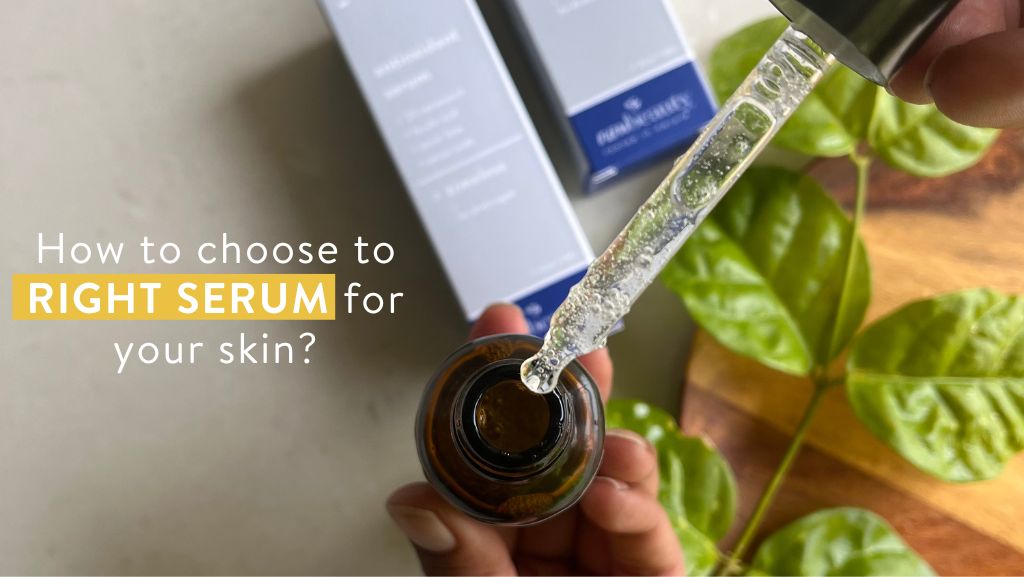
How To Choose Right Serum For Your Skin?
The world of skincare can be overwhelming, with countless products promising transformative results. Among so many options available in the market, different serums target different skin concerns. However, choosing the right serum for your skin can be a little difficult and confusing. In this guide, we'll explore the key factors to consider when selecting a serum that aligns with your unique skin needs.
Understanding Your Skin Type
The first step in choosing the right serum is understanding your skin type. Oily, dry, combination, sensitive, or mature skin, each type has its specific requirements. Serums are potent concoctions formulated to address various concerns, such as Pigmentation or scars, ageing, dullness, acne. Identify your skin type and primary concerns to narrow down your options and make an informed decision.
Ingredients Matter
The effectiveness of a serum lies in its ingredients. Look for serums with active ingredients known for their skincare benefits. For instance, humectants like Glycerine or Hyaluronic acid are excellent for hydration, vitamin C or Resveratrol for brightening and antioxidant dose, retinol for anti-ageing, niacinamide for calming and balancing the skin and so forth and so on. Researching and understanding these ingredients can help you choose a serum that will suit your skin's needs.
Consider Your Skin Concerns
Different serums target specific skin concerns. If you're looking to combat fine lines and wrinkles, opt for an anti-ageing serum with ingredients like retinol or peptides. A brightening serum with vitamin C or alpha arbutin may be more suitable for hyperpigmentation and dark spots. Assess your skin concerns and choose a serum that addresses them.
Check for Compatibility
While a particular serum may be effective for one person, it may not suit another due to individual skin sensitivities. Always perform a patch test before incorporating a new serum into your routine, especially if it contains active ingredients. This can help you identify any potential allergic reactions or irritations and ensure the product is compatible with your skin.
Pay Attention to Formulation
Serums come in various formulations, including water-based, oil-based, and gel-based. Consider your skin type and personal preferences when selecting the right formulation. Oily or acne-prone skin may benefit from a lightweight, water-based serum, while dry skin might require a more nourishing oil-based option. Gel-based serums are often suitable for combination skin.
Read Reviews and Seek Recommendations
Before making a purchase, read reviews and seek recommendations from trusted sources. Customer reviews can provide valuable insights into a brand or product's efficacy and whether it delivers the promised results. Additionally, consulting with skincare professionals or dermatologists can help you make an even better decision based on your specific skin concerns.
Choosing the right serum for your skin involves a combination of understanding your skin type, identifying your concerns, and selecting a product with the right ingredients and formulation. By considering these factors and conducting thorough research, you can find a serum that complements your skincare routine and addresses your unique skin needs. Remember that consistency is key, and results may take time, so be patient and enjoy the journey to healthier, more radiant skin.
Check out our different serums here and choose the one that suits the specific needs of your skin.
Love,
Sunayana
Frequently Asked Questions related to Serum For Skin
Is face serum good for skin?
Yes, face serum can be good for the skin because it contains concentrated active ingredients that target specific skin concerns like hydration, brightening, or anti-aging.
Is vitamin c serum good for skin?
Yes, vitamin C serum is good for the skin, it helps brighten and even out skin tone, and protect against sun damage.
How to use face serum for oily skin?
For oily skin, apply a small amount of face serum after cleansing and toning by using gentle, upward strokes to massage the serum into your skin.
What is the use of serum for skin?
Skin Serum targets specific skin concerns such as wrinkles, dark spots, or dehydration and serums penetrate deeply to deliver potent benefits, promoting healthier, more radiant skin.
What does retinol serum do for your skin?
Retinol serum helps improve skin texture, reduce wrinkles, and promote collagen production.
What does vitamin a serum do for skin?
Vitamin A serum helps renew skin cells, promoting a smoother texture and reducing signs of aging like wrinkles and fine lines.
Is serum important for skin?
Yes, serum is important for skin as it delivers concentrated active ingredients deeper into the skin, targeting specific concerns like hydration, brightening, or anti-aging.

Leave a comment
This site is protected by hCaptcha and the hCaptcha Privacy Policy and Terms of Service apply.